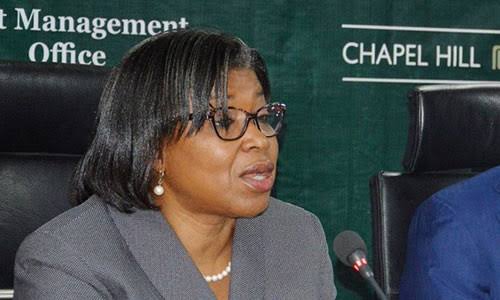Based on the most recent statistics available, the Debt Management Office, the Federal Government is becoming less interested in taking out loans abroad.
According to the end of September, the total national debt was N87.91 trillion. As opposed to rising, as it had done in the past, the total amount of foreign debt was severely reduced. Nigeria’s total public debt increased slightly during the third quarter of 2023 from N87.38tn at the end of the second quarter to N87.91tn. This quarter, it was up 0.61 per cent.
New data on debt stock, which was made public on Wednesday by the Debt Management Office, supports this. According to the figures, domestic debt totaled N55.93 trillion over the reported period, while total external debt was N31.98 trillion.”
Speaking on the data, DMO stated that, “when compared to the June 30, 2023, figure of N87.38tn, the total public debt stock represents a marginal increase of 0.61 per cent at N87.91tn.” This pattern can be explained by the fact that the amount of external debt decreased from $43.16 billion to $41.59 billion by September 30, 2023, and the amount of domestic debt increased by a very little amount of N1.8 trillion.Because a $500 million Eurobond was redeemed and $413.859 million was paid as the first principle payment on a $3.4 billion loan taken out in 2020 during COVID-19, the amount of external debt fell.
The federal government paid N1.79 trillion for servicing domestic debt in Q3 2023, while $1.39 billion was spent on servicing overseas debt.
Following several protests concerning the nation’s debt situation and the possibility of a government default, DMO declared that the government’s recent debt service shows its resolve to fulfil its financial commitments.
As per Patience Oniha, the Director-General of the Debt Management Office, the high rates of inflation in the West are the reason behind the high rates on blue-chip securities.
She mentioned that the government has been concentrating more on the home market while speaking on the fringes of the negotiations to create the African Debt Managers Initiative Network, which is being led by the African Development Institute of the African Development Bank in Abuja.
“The US and UK governments’ rates on blue-chip securities are high on the international market due to the high rate of inflation,” the speaker stated.
The Russia-Ukraine conflict has also left a cloud of uncertainty over the entire world. Foreign investors are therefore a little more circumspect. These investments are made in securities with triple A or double A ratings, which offer them substantial yields of 4% or 5%.
The US dollar is predicted to maintain its rates in 2024, she pointed out, and stability is starting to return to these nations.
The Federal Government has increased its total new domestic borrowing to N7.04 trillion in 2023, she disclosed while making comments on domestic borrowing.
As the DMO DG said, “I’m glad to report that the new domestic borrowing in 2023 was N7.04 trillion, and it has been fully raised as of right now. Therefore, it has been raised, and I don’t need to describe how we did it. when weighed against the N3.5 trillion from the previous year. The market is indebted, which means we need to raise money.
The government is anticipated to maintain its glut in the domestic market in 2024, she noted, adding that the liquidity in the market has been encouraging.
Government revenue problems are still a major problem, and Oniha believes that these problems must be resolved. The nation won’t need to take on more debt if revenues increase.
She stated, “We expect the narrative to change to higher revenues,” in an interview with CNBC Africa. “Several governments had tried to change that narrative, improve revenue, but now we see a presidential committee on fiscal reforms and taxes.” The trajectory in that direction is visible if you look at the MTEF for 2024–2027.
Your demand for borrowing will undoubtedly decrease if your revenues rise. You are able to offer other services with your revenue. You will also have a reduced debt-to-income ratio.
The DMO echoed its DG when it said, “Nevertheless, Mr. President’s initiatives and actions towards revenue generation remain important for Nigeria’s overall fiscal balance,” in a statement released on Wednesday along with the debt data.
The nation must raise its revenue position going forward since it cannot afford to continue depending on borrowing, according to recent remarks made by Wale Edun, the Coordinating Minister for the Economy and Minister of Finance.
The Minister of Budget and Economic Planning, Abubakar Bagudu, reaffirmed the nation’s revenue position when he announced the public budget for 2024 and stated that revenue generation continued to be the biggest obstacle to the nation’s solvency.
According to him, Nigeria’s fiscal viability is still primarily hampered by revenue production. To increase income creation, the government is, nevertheless, examining its present tax and budgetary policies. Within this Administration’s current term, the goal is to raise the revenue to GDP ratio from less than 10 percent to 18 percent.
The World Bank, which supported this view, had previously predicted that, barring recent reforms and policy changes, Nigeria’s debt servicing costs would exceed 200 percent of its GDP by 2026. In the medium run, the bank thinks, however, the country’s recent reforms will increase revenues and maintain debt levels below 40% of GDP.
From roughly 101.5% of total income in 2022 to 43% in 2026, it was anticipated that debt servicing costs will decrease.
Join Television Nigerian Whatsapp Now
Join Television Nigerian Facebook Now
Join Television Nigerian Twitter Now
Join Television Nigerian YouTUbe Now





